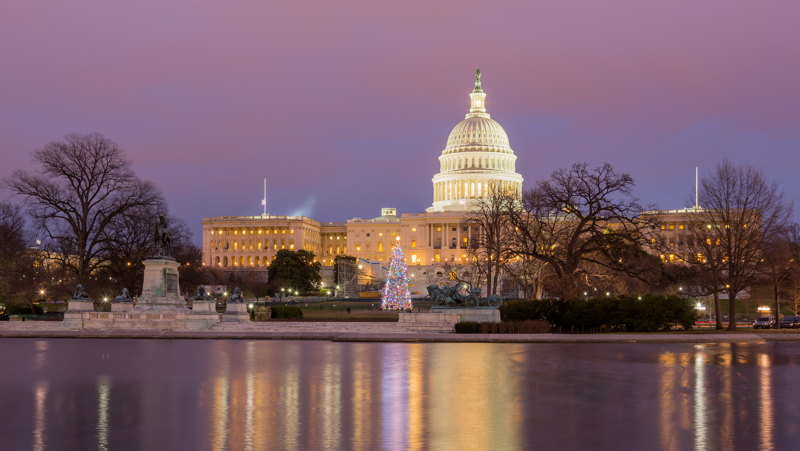
The Regulatory Review highlights the top regulatory news and scholarship of 2019, as selected by our staff.
In lieu of our regular Friday feature—the Week in Review—The Regulatory Review is recapping some of the top regulatory news from the past year, including the government shutdown, the Trump Administration’s continued push for environmental deregulation, and more. We are also pleased to highlight some of the regulatory scholarship featured this year in the Week in Review.
JANUARY
- Over 800,000 federal workers did not receive paychecks in the third week of the government shutdown. Some were told not to report to work during the shutdown, and others deemed “essential”—such as officers at the U.S. Transportation Security Administration—were required to work without pay. Other agency impacts included canceled food safety inspections by the U.S. Food and Drug Administration and a lapse in funding for housing assistance programs by the U.S. Department of Housing and Urban Development.
- On January 25, President Donald J. Trump signed a bill to fund the federal government through February 15, ending the 35-day government shutdown. President Trump praised both parties for being “willing to put partisanship aside” but reaffirmed the need for walls in “pre-determined high-risk locations,” which the bill did not fund.
FEBRUARY
- In his State of the Union address, President Trump spoke about his hopes for a U.S. trade policy that favors American workers, legislation that lowers health care and drug prices, and a “safe, lawful, modern, and secure” immigration system. President Trump called on Congress to “break decades of political stalemate” by rejecting “the politics of revenge, resistance, and retribution.” Former Georgia gubernatorial candidate Stacey Abrams, delivering the Democratic response, criticized President Trump for the government shutdown, calling it a “stunt” that “defied every tenet of fairness and abandoned not just our people, but our values.”
- In a 52-47 vote, the U.S. Senate confirmed Andrew Wheeler as Administrator of the U.S. Environmental Protection Agency (EPA). Wheeler had served as acting administrator since former EPA Administrator Scott Pruitt resigned in July 2018. U.S. Senator John Barrasso (R-Wyo.) reportedly stated that despite Wheeler’s deregulatory focus, he has “prioritized commonsense policies” that encourage economic growth. U.S. Senator Susan Collins (R-Maine), the only Republican senator to oppose the confirmation, reportedly stated that Wheeler’s regulatory choices were “not in the best interest of our environment and public health.”
MARCH
- Regulators in at least 40 countries halted flights of Boeing 737 Max planes after the fatal Ethiopian Airlines crash, the second involving a Boeing 737 Max in the last six months. The European Aviation Safety Agency grounded domestic 737 Max flights as a “precautionary measure” while also suspending operations by these planes in and out of the European Union. The U.S. Federal Aviation Administration initially did not ground 737 Max flights, but later issued an emergency order doing so, noting similarities between the two crashes that “warrant further investigation.”
- The U.S. Senate voted 59–41 to terminate the national emergency declared by President Trump at the U.S.–Mexico border, following a 245–182 vote by U.S. House of Representatives to do the same. U.S. Senator Mitt Romney (R-Utah) stated that he supported the measure because he was “seriously concerned” about overreach on the part of the executive branch. But President Trump declared he was “prepared to veto” the measure to keep the national emergency intact, as allowed under the National Emergencies Act.
APRIL
- U.S. Attorney General William Barr released a redacted version of the Special Counsel’s report on Russian interference in the 2016 presidential election. Attorney General Barr maintained his prior findings that there was no evidence the Trump campaign had “conspired or coordinated with the Russian government.” Others, however, remained skeptical. House Judiciary Committee Chairman Jerrold Nadler (D-N.Y.) stated that the redacted report contained “disturbing evidence that President Trump engaged in obstruction of justice.”
- U.S. Senator Bernie Sanders (I-Vt.) introduced the Medicare for All Act, co-sponsored by 14 Democratic senators, which would eliminate the private health insurance industry and establish a national health insurance system with universal coverage for U.S. residents. “Health care should be a right for every single American, not a privilege reserved for the healthy and the wealthy,” said U.S. Senator Jeff Merkley (D-Ore.), who is a co-sponsor of the bill. White House press secretary Sarah Sanders responded that the bill “confiscates every American’s private health insurance” and that “America will never be a socialist country.”
MAY
- Special Counsel Robert Mueller explained that his office did not consider charging President Trump with obstruction of justice because of an internal U.S. Department of Justice (DOJ) policy that prohibits indicting sitting a President. But Mueller stated that “if we had had confidence that the President clearly did not commit a crime, we would have said so.” Following Mueller’s remarks, Senator Cory Booker (D-N.J.) stated that “Congress has a legal and moral obligation to begin impeachment proceedings immediately.” Senator Lindsey Graham (R-S.C.), however, maintained that “the case is over” and urged Congress to move on.
- A coalition of 23 states, counties and municipalities sued the U.S. Department of Health and Human Services (HHS) over a new rule that seeks to strengthen health care providers’ ability to refuse to perform abortions or other procedures under federal conscience laws. Roger Severino, Director of the Office for Civil Rights at HHS, said that the rule “ensures that healthcare entities and professionals won’t be bullied out of the healthcare field because they decline to participate in actions that violate their conscience.” New York Attorney General Letitia James, who is leading the lawsuit, called the rule “a gross misinterpretation of religious freedom that will have devastating consequences on communities throughout the country.”
JUNE
- In a 5–4 decision, the U.S. Supreme Court ruled that political gerrymandering claims were political questions beyond the reach of the federal courts. Chief Justice John Roberts delivered the majority opinion, writing that “there are no legal standards discernible in the Constitution for making such judgments, let alone limited and precise standards that are clear, manageable, and politically neutral.” In a joint dissent, Justice Elena Kagan criticized the majority’s refusal to remedy a constitutional violation which targeted “the most fundamental” right to participate equally in the political process.
- The Supreme Court held 5–4 that the U.S. Department of Commerce’s explanation of its decision to add a citizenship question to the census was pretextual, and thus violated the requirement that agencies “disclose the basis” of their actions under the Administrative Procedure Act. On its finding, the Court affirmed the U.S. District Court for Southern District of New York’s prior decision to remand the issue to the Department for further explanation. Justice Clarence Thomas dissented in part, calling the decision “an unprecedented departure from our deferential review of discretionary agency decisions.”
JULY
- The U.S. Department of Homeland Security and U.S. Department of Justice issued a joint interim final rule barring individuals who pass through Mexico from a third country from being granted asylum at the U.S. border. The rule does not apply to individuals who have previously been denied asylum in one or more countries through which they traveled prior to arrival in the United States, victims of human trafficking, or individuals who have only passed through nations that have not signed international treaties on refugee protection. The rule goes into immediate effect but already faces legal challenges from immigration advocacy groups.
- The U.S. Department of Agriculture (USDA) proposed a rule to end automatic Supplemental Nutrition Assistance Program (SNAP) eligibility for low-income households already receiving other supplemental benefits. The rule would require over 3 million SNAP recipients to meet independent financial eligibility standards. USDA Secretary Sonny Perdue stated that the rule would close a loophole that “has been used to effectively bypass important eligibility guidelines,” leading to “misuse” of SNAP benefits. Senate Committee on Agriculture, Nutrition, and Forestry Ranking Member Debbie Stabenow (D-Mich.) called the rule “harmful,” saying that it “would take food away from families, prevent children from getting school meals, and make it harder for states to administer food assistance.”
AUGUST
- EPA announced a proposed rule that would eliminate a restriction on coal ash—the residue left after burning coal. EPA Administrator Andrew Wheeler stated that the proposed rule would “further responsible management of coal ash while protecting human health and the environment.” Lisa Evans, senior counsel at Earthjustice, criticized the proposed rule as a “gift” from Wheeler “to his former employers at the cost of public health.”
- The U.S. Department of Homeland Security modified the Flores Settlement, which provides protective standards for detaining children in detention centers. Senator Elizabeth Warren (D-Mass.) criticized the revision, stating that it would put “thousands of children in danger” by overhauling a requirement under the Flores Agreement that children cannot be held in a detention center for over 20 days. Senator Lindsey Graham (R-S.C.) had stated previously that as a measure to curb undocumented immigrants from entering the United States “if we don’t change the Flores decision, they’ll keep coming forever.”
SEPTEMBER
- EPA and the U.S. Department of the Army repealed an Obama-era rule that had expanded the number of waterways classified as Waters of the United States under the Clean Water Act. EPA Administrator Andrew Wheeler also outlined plans to proceed with a new proposed definition of Waters of the United States that will “provide greater regulatory certainty for farmers, landowners, home builders, and developers nationwide.” American Farm Bureau Federation President Zippy Duvall praised the change, claiming that the previous rule “made conservation more difficult and created huge liabilities for farmers.” But Jon Devine, director of federal water policy at the Natural Resources Defense Council, accused the agencies of repealing “important protections without regard for the law or sound science,” adding that the change “will certainly be challenged in court.”
- The U.S. Department of Labor issued a final rule raising the salary threshold for when workers must be paid overtime under federal law. Starting in January 2020, employees making less than $35,568 per year must be paid overtime if they work more than 40 hours per week, a substantial increase from the current threshold of $23,660. In issuing the final rule, the Labor Department formally rescinded the Obama Administration’s 2016 overtime rule, which doubled the threshold to $47,476 but never actually went into effect. Judge Amos Mazzant of the U.S. District Court for the Eastern District of Texas had blocked the 2016 rule, holding that the Labor Department exceeded its authority in increasing the threshold so dramatically.
OCTOBER
- President Trump signed a pair of executive orders restricting agencies from explaining what a regulation may mean through guidance documents and requiring agencies to increase public awareness of the rules they enforce. Office of Management and Budget Deputy Director Russ Vought said the orders will protect “American families from unlawful government regulations and abuse.” James Goodwin, a policy analyst with the Center for Progressive Reform, reportedly criticized the notion that the orders will help industry because “the primary function of guidance is to alleviate regulatory uncertainty, which is a huge plus for industry.”
- Although the Supreme Court prohibited adding a citizenship question to the 2020 census, the U.S. Census Bureau asked states to share drivers’ licenses to verify the citizenship status of those who have responded to the census. “It’s really just an act that’s going to instill a lot of fear,” Jennifer Lee, a professor at the Temple University Beasley School of Law, reportedly argued. The Census Bureau stated that it will not share any data with any other government agency or with law enforcement authorities.
NOVEMBER
- U.S. Secretary of State Mike Pompeo announced that the United States will formally withdraw from the Paris climate agreement. Secretary Pompeo said that President Trump’s decision to withdraw was prompted by “the unfair economic burden imposed on American workers, businesses, and taxpayers by U.S. pledges made under the Agreement.” Because withdrawal is a yearlong process, however, the 2020 federal election may eventually result in a recommitment of the United States to the climate accord. But Jonathan Pershing, director of the Hewlett Foundation and former climate change envoy under the Obama Administration, reportedly stated that even if the United States recommits, it will already have “been written off in many cases as a partner.”
- The Office of Information and Regulatory Affairs published its Fall 2019 Unified Agenda and Regulatory Plan, which includes the regulatory plans for over 60 federal agencies, departments, and commissions. The Unified Agenda reflects the Administration’s continued commitment to President Trump’s 2017 executive order directing agencies to repeal two rules for every new rule issued. This release of the unified agenda—published biannually—is particularly significant, as it lists the rules agencies will try to finalize before the 2020 presidential election.
DECEMBER
- The U.S. Department of Agriculture approved a new rule that will cut three-quarters of a million people from receiving food stamps by tightening work requirements. Secretary of Agriculture Sonny Perdue stated that “We need to encourage people by giving them a helping hand but not allowing it to become an indefinitely giving hand.” U.S. Representative Marcia L. Fudge (D-Ohio) said that the agency has demonized those who use food stamps “as lazy and undeserving.”
- The U.S. Court of Appeals for the Fifth Circuit ruled that the Patient Protection and Affordable Care Act’s requirement that every American have health insurance was unconstitutional. It sent the case back to a federal district court to decide whether the entire law should be struck down. President Donald J. Trump called the decision a “win for all Americans” but claimed that it “will not alter the current healthcare system.”
WHAT WE WERE READING THIS YEAR
- The 2019 Super Bowl was the first one in which fans could legally gamble on the outcome due to the Supreme Court’s decision in Murphy v. National Collegiate Athletic Association—which held that states were allowed to permit and regulate sports wagering—Chloe Aiello wrote in a recent article. But more changes are needed for legal wagering to “compete with the black market” of illegal sports betting, argued DraftKings Chief Executive Officer Jason Robins. Robins described legalized sports wagering through online and mobile platforms as “absolutely critical” to the success of the industry and called for “sensible” regulations that would allow the legal industry to thrive.
- What influence, if any, does the executive branch have on deportation hearing outcomes? In a study forthcoming in the Georgetown Law Journal, Catherine Kim of the University of North Carolina School of Law and Amy Semet of Princeton University found that although the identity of the President who appointed an immigration judge was not a significant predictor of outcomes, the identity of the President at the time of the decision mattered significantly. Bush-appointed judges were 14 percent less likely to order deportation under the Obama Administration than under the Trump Administration, and 12 percent less likely to order deportation under Bush than under Trump, according to Kim and Semet.
- Notice-and-comment procedures are an important tool of political action, according to Matthew Cortland, a Massachusetts attorney, and Karen Tani of University of California, Berkeley School of Law. In addition to the important role that public comments play as evidentiary support for eventual legal challenges to agency actions, Cortland and Tani argued that notice-and-comment procedures enhance democracy by creating a public record of the impacts of government decision-making. They further noted that the procedures offer marginalized people an opportunity to “call out the power dynamics they see operating in the world.”
- Originalist critiques of the constitutionality of the administrative state may rest on shaky historical ground, according to a forthcoming article by University of Pennsylvania Law School professor Sophia Lee in the University of Pennsylvania Law Review. Lee highlighted a growing body of historical research demonstrating that federal agencies in the 19th century exercised broad discretion in adjudicating constitutional claims, often with minimal or no judicial review. The possibility that agencies, rather than courts, were historically the primary interpreters of the Constitution should trouble those who advocate a return to 19th century administrative law as a means of reining back the administrative state, according to Lee.
- Should agencies use their regulatory authority to fix legislative drafting errors? Perhaps not, Leigh Osofsky of the University of North Carolina School of Law argued in a forthcoming article for the Iowa Law Review. Because of the messiness of the legislative process, Osofsky wrote, administrative agencies often quietly fix apparent drafting errors through rulemaking or informal guidance. But the practice violates principles of congressional supremacy and democratic accountability, she argued. Osofsky concluded that it would be better to reform the legislative process itself or improve agency transparency and accountability.
- In a forthcoming article for the Harvard Law Review, University of San Diego School of Law Professor Mila Sohoni argued for the constitutionality of the “universal injunction”—a court ruling that blocks the government from enforcing a law against anyone, not just the plaintiff. Noting that the Supreme Court has deployed the universal injunction as far back as 1913, Sohoni argued that if the Supreme Court possesses the authority to issue a universal injunction under Article III of the Constitution, so too must a lower court. Moreover, in light of the rich history of universal injunctions and the important role such orders have played in checking executive power, Sohoni suggested that we should be skeptical of proposals to strip lower courts of their injunctive power.
This page is part of a four-part series, entitled The 2019 Regulatory Year in Review.



